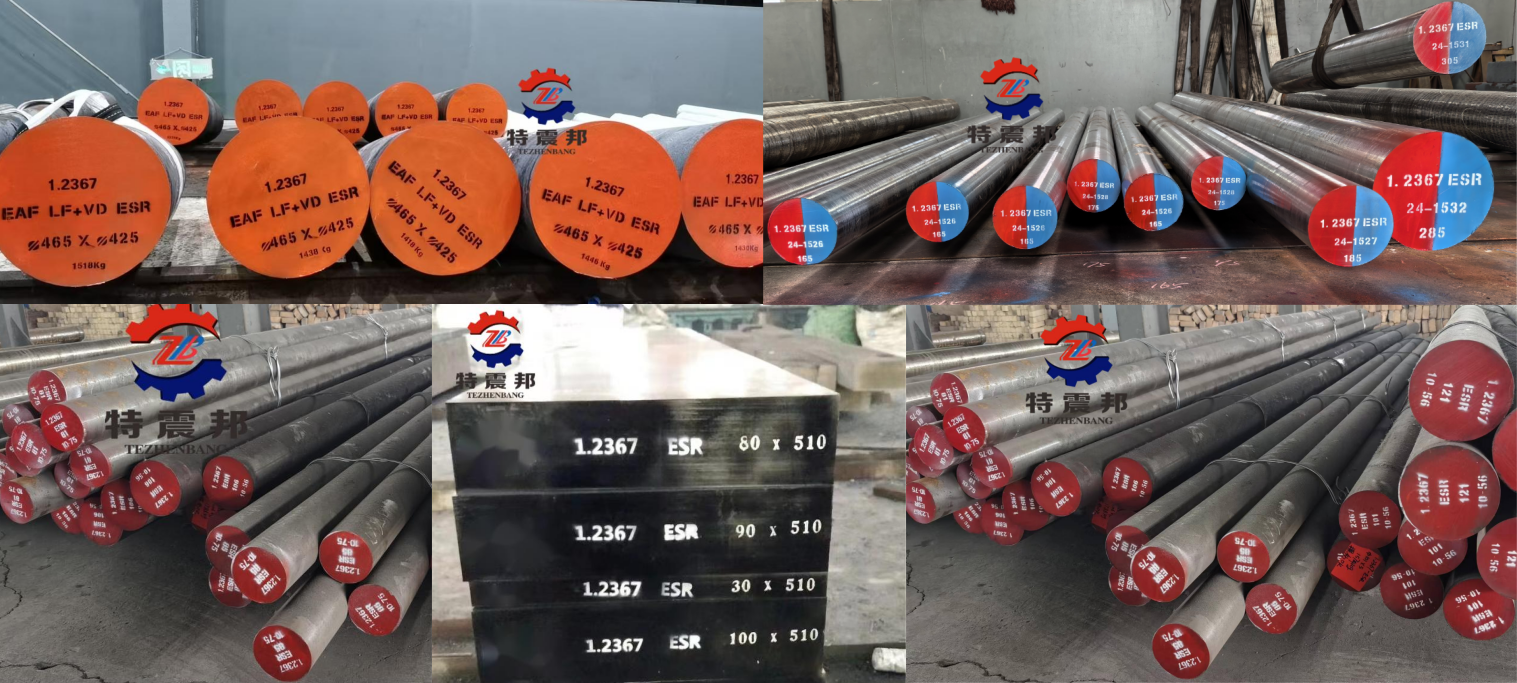Detailed Introduction
| Steel grade |
Comparison of grades from various countries |
Technical conditions |
Chemical composition |
||||||||||||||
| C |
Cr |
Mo |
V |
S |
P |
Si |
Mn |
Ni |
W |
Al |
Cu |
Nb |
Co |
B |
|||
| 1.2367 |
Germany (1.2367) Austria (W303) |
Agreement |
0.35 ¦ 0.42 |
4.80 ¦ 5.50 |
2.70 ¦ 3.30 |
0.40 ¦ 0.70 |
≤0.015 |
≤0.030 |
0.20 ¦ 0.50 |
0.30 ¦ 0.60 |
|
|
|
|
|
|
|
1.2367 mold steel is a type of tool steel with high strength, high hardness, and high toughness, mainly used for manufacturing high-strength and high-hardness mold parts, such as injection molds, extrusion molds, and forming molds. This steel has excellent thermal strength, toughness, and hardness, maintaining high hardness and excellent wear resistance at higher temperatures. 1.2367 steel is a type of hot work mold steel. Its characteristics include high-temperature strength, wear resistance, and corrosion resistance, with higher wear resistance compared to other tool steels. Additionally, it has good machinability and heat treatment properties. Furthermore, 1.2367 mold steel has good forgeability, hot workability, and machinability, making it adaptable to different processing requirements, with a wide range of applicability. This steel also has excellent corrosion resistance and wear resistance, effectively protecting the surface of the mold from damage.
In summary, 1.2367 mold steel is an excellent tool steel with a wide range of applications, possessing outstanding mechanical properties and durability, meeting the needs of various mold processing fields. The composition ratio can be adjusted appropriately according to specific application scenarios to meet specific usage requirements. After heat treatment, 1.2367 mold steel can also have hardening elements added, such as tungsten, cobalt, and nickel, to enhance its hardness and wear resistance.
1.2367 mold steel has the following physical properties:
Hardness: In the heat-treated state, the hardness of 1.2367 mold steel can reach 56-60 HRC.
Strength: 1.2367 mold steel has very high heat resistance, allowing it to work stably at high temperatures for extended periods.
Toughness: 1.2367 mold steel has good toughness, maintaining stability under high stress and impact loads.
Corrosion resistance: 1.2367 mold steel has certain corrosion resistance, allowing it to work in humid and corrosive environments.
Applications of 1.2367 mold steel
1.2367 mold steel has a wide range of applications, mainly used for manufacturing various mold parts, such as injection molds, extrusion molds, forming molds, die-casting molds, shearing molds, and punching molds.
In addition, this steel can also be used to manufacture various mechanical components, tools, fixtures, and lathes, with a wide range of applications in mechanical processing. This steel can undergo heat treatment, surface treatment, and various other process treatments according to different processing requirements to meet the needs of different fields.
In conclusion, 1.2367 mold steel is a widely used and excellent tool steel that meets the needs of various mold processing and mechanical processing fields.
Advantages of choosing 1.2367 mold steel
1.2367 mold steel has excellent mechanical properties and durability, with a wide range of applications in various mold processing and mechanical processing fields. Using 1.2367 mold steel can bring the following advantages:
1. High strength and high hardness, ensuring the stability and durability of mold parts, extending the lifespan of mold parts.
2. Excellent wear resistance and corrosion resistance, effectively protecting the mold surface from damage, improving mold work efficiency and service life.
3. Excellent machinability and hot workability, allowing for appropriate processing according to different processing requirements to meet the needs of various fields.
4. A wide range of applications, suitable for manufacturing various mold parts and mechanical components, with high adaptability.
In summary, using 1.2367 mold steel can bring multiple advantages, suitable for various mold processing and mechanical processing fields, making it a recommended tool steel.
Conclusion
1.2367 mold steel is an excellent tool steel with high strength, high hardness, high toughness, good forgeability, and hot workability, widely applicable in various mold processing and mechanical processing fields.
Using 1.2367 mold steel can bring multiple advantages, such as high wear resistance, high corrosion resistance, excellent machinability, and hot workability, effectively improving the service life and work efficiency of mold parts.
Therefore, it is recommended to use 1.2367 mold steel in mold processing and mechanical processing fields to meet different processing requirements and improve work efficiency and service life.

key word:
Hot working mold steel
Cold working mold steel
Plastic mold steel
Forging series
Message Consultation
Service hotline:
Company address
Telephone
Address: No.128 Zhangzhihe Avenue, Dapaishan Village, Xisaishan District, Huangshi City, Hubei Province

